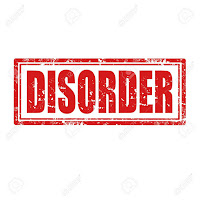DISORDERS & ITS CAUSES.
Disorder is usually used for mental disabilities. Disorder is any ailment that disturbs the health of an individual. Most probably, disorders create entrants in an individual performance and reduces efficiency. In the beginning disorders seem to be ordinary but they usually grow or spread in harmful manner in an individual.
It can be said that a disorder is anything that disrupts the normal functioning of an individual. Disorders can also be defined as a blip in the usual functioning of a person.Types of Disorders & their Causes -:
A. Attention Deficit Hyperactivity Disorder (ADHD) -
Attention deficit hyperactivity disorder is a group of behavioural symptoms that include inattentiveness, hyperactivity and impulsiveness. In fact, it is a medical condition that it affects how well can someone sit still coma focus and pay attention. Generally, ADHD affected children have differences in the part of their brains that control activity and attention. Children's my affected this disorder may be hyperactive or may be unable to control the impulses for stop.
Causes :-
1. Genetic Factors - Research studies have indicated that there is a strong genetic link in ADHD. It is not a disorder that is passed socially. Research studies indicate that parents siblings and children of people with ADHD may be up to five times more likely to have the disorder then people who are not related to someone with ADHD.
2. Diet - There are a number of evidences which show that taking a particular type of food for ford additives plays a significant role in causing ADHD.
3. Low Birth weight - It is observed that children with low birth weight are more likely to develop ADHD.
4. Brain Injuries - When a baby's brain is damaged before or after birth, it would make the baby more likely to develop ADHD later on.
B. Sensory Processing Disorder (SPD) -
Sensory processing disorder is a condition in which the brain has difficulty in receiving and responding to information that comes in through the census. In fact, it refers to the way the nervous system receives messages from the senses and then returns them into proper motor and behavioural responses. Sensory processing disorder may affect a sense such as touch, sight, taste or movement. In some cases, the person with sensory processing disorder may remain unresponsive to anything around him. Even he may fail to give any responses to Extreme heat or cold or pain.
Causes :-
1. Physical Cause - Research studies have indicated that individuals with sensory processing disorder have abnormal brain activity when exposed to certain stimuli. Individuals with SPD have differences in brain structure which provide a biological basis for the onset of this order.
2. Genetic Cause - Research studies indicate that children born to adults who have autism spectrum disorder may be at the higher risk for developing SPD. Scientists allude that the cause of SPD are coded into the child's genetic material.
3. Low Birth Weight - Low birth weight is also considered one of the causes of sensory processing disorder.
4. Environmental Factors - Usually, children who are adopted often experience sensory processing disorder due to some restrictions in their early lives or poor prenatal care.
C. Autism Spectrum Disorder (ASD) -
Autism spectrum disorder is a disorder that affects development. Here, the word spectrum refers to the range of symptoms and their severity. Generally, the young children with ASD have difficulties with communication, language, social skill and behaviour. Usually, the affected children with ASD may show symptoms. They avoid eye contact and preferred to be alone. They don't like to be embraced. They repeat words and actions. They feel difficulties in expressing their needs and emotions. They are very sensitive to taste, smell and sound.
Causes :-
1. Genetic Factors - Genetic problems seem to play a significant role in ASD. These problems can happen in two ways.
The first is that something happens during fetal development that alters a gene.
The second way is that the child inherits problematic gene / genes from one or both parents.
2. Environmental Factors - It is also averred that mother's exposed to high levels of pesticides and air pollution may also be at a higher risk of having a child with ASD.
3. Brain Development - It has been observed that the brain of children with ASD develops differently in growing children. In such children comma brain grows at a faster rate during the first three years of childhood. Such childrens have more cells than they require. Even the connections between the cells are not proper. It may be one of the causes of ASD.
It is important to keep in mind that these factors, by themselves, don't cause autism. Rather, in combination with genetic factors, they appear to increase race.
D. Oppositional Defiant Disorder (ODD) -
Oppositional defiant disorder is a set or group of behavioural disorders called disruptive behaviour disorder. It is called my list name because children who have this disorders always tend to disrupt those around them. Individuals affected by this disorder usually behave like Rebel, argue with adults refused to obey and are obstinate. They have difficulty in making friends and have low self-esteem. They have negativity in their behaviours. Then display angry and irritable modes as well as vindictive behaviour.
Causes :-
There is no specific or clear cut cost of oppositional defiant disorder. It is widely believed that a combination of various factors such as biological or genetic physical psychological social risk factors play a significant role in the development of ODD.
The various factors of ODD are described subsequently.
1. Biological or Genetic Cause - Children are more susceptible to developing oppositional defiant disorder if they have a parents with the history of ADHD or ODD. Also, children may be affected with ODD if their parents have depression are bipolar disorder, or exposure to toxins or poor nutrition.
2. Social Factors - Oppositional defiant disorder may be due to inconsistent discipline, divorce, poverty, chaotic environment in the family and exposure to violence.
3. Psychological Factors - Children may develop ODD if they don't have good relations with parents or have neglectful parents or have inability to develop social relationships.
4. Physical Factors - The presence of ODD trades have been linked to existence of abnormal amounts of some brain chemicals. The brain chemicals, known as neurotransmitters, are responsible for proper functioning of a body activities and it is best for our well being to have them in a state of balance in our brain. If there is any imbalance another parts of brain, the symptoms of ODD may occur
E. Obsessive Compulsive Disorder (OCD) -
Obsessive compulsive disorder is a mental health disorder that affects people of all ages and walks of life. It occur when an individual gets caught in a cycle of obsessions and compulsions. In simple words, OCD is a type of mental disorder that causes repeated unwanted thoughts. To get rid of unwanted thoughts, he / she performs the same task / activity again and again.
For example, a person may fear that everything she touches has jumped on it. So to get rid of that year she washes her hands again and again.
Main Obsessions are :-
1. A fear of harm to yourself or a loved one.
2. A fear of getting dirty.
3. Having excessive doubt on any individual.
4. A fear of making mistakes.
5. A fear of being embarrassed and contamination of germs.
Main compulsions are :-
1. Bathing or washing hands several times.
2. Repeating specific words.
3. Constant praying.
4. Persistently counting while doing usual tasks.
5. Checking things over and over again.
Causes :-
The exact cause of obsessive compulsive disorder is still unknown fullstop research studies suggest that there may be a problem with the way one part of the brain sends information to another part. Serotonin is the chemical in the brain that sends messages from one part to another. Insufficiency of serotonin in may help in causing OCD. Stress and anxiety do not cause OCD but they may worsen the symptoms of OCD.
Recent studies have indicated that there may be considerable genetic basis for OCD. Depression is also thought to be the cause of OCD but the experts opinion is split.
Thankyou for visiting









Comments